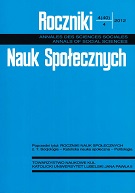Polityka rodzinna, wykształcenie i kariera zawodowa matek w Niemczech, Stanach Zjednoczonych i Szwecji
// Motherhood, family policy, education, and careers in Germany, the U.S., and Sweden
Author(s): Silke Aisenbrey, Marie Evertsson, Daniela GrunowSubject(s): Social Sciences
Published by: Towarzystwo Naukowe KUL & Katolicki Uniwersytet Lubelski Jana Pawła II
Keywords: Occupational mobility Mothers; Employment career; Life course; International comparison; Eventhistoryanalysis; mobilność zawodowa matki; kariera zawodowa; życiorys; międzynarodowe porównania; analiza zdarzeń
Summary/Abstract: This article compares the duration of and consequences for employment interruptions for mothers with distinct educational qualifications in cross-national perspective. We analyze the duration of mothers’ employment interruption and the relative quality of the job after childbirth, for high and low qualified mothers in Germany, Sweden, and the United States. Analyses are based on harmonized national longitudinal data sets (GLHS-West, NLSY, LNU), which allow us to study mothers’ careers over the past 30–35 years. We apply event-history analysis to study how long mothers with distinct educational levels interrupt employment after childbirth, and how the patterns of return to work differ with respect to mothers’ educational level. In all three countries the highly educated display a greater labor market attachment. In the US, almost half of the mothers with some college background, compared to only a quarter of high-school dropouts stay employed continuously after childbirth. In Sweden, basically all mothers take time-out for at least half a year. In Germany, 25% of mothers with university entrance qualification do not claim parental leave. In Germany and Sweden consequences of leave extensions seem to operate independent of mothers’ educational levels. In the U.S. medium and highly educated mothers tend to return more slowly after the enactment of the FMLA.
Journal: Roczniki Nauk Społecznych
- Issue Year: 40/2012
- Issue No: 4
- Page Range: 131-174
- Page Count: 44
- Language: Polish

